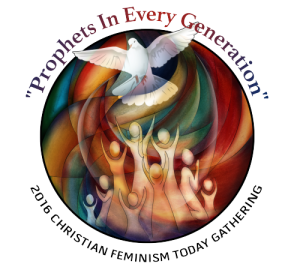“Embracing the Other,” presentation by Grace Ji-Sun Kim at Christian Feminism Today Gathering

 Another challenging, inspiring presentation at the 2016 Christian Feminism Today Gathering was “Embracing the Other” by Rev. Dr. Grace Ji-Sun Kim. Grace drew from her new book, Embracing the Other: The Transformative Spirit of Love.
Another challenging, inspiring presentation at the 2016 Christian Feminism Today Gathering was “Embracing the Other” by Rev. Dr. Grace Ji-Sun Kim. Grace drew from her new book, Embracing the Other: The Transformative Spirit of Love. 
Grace begins with a statement of the importance of narrative theology: “Theology is biography; biography is theology.” She then tells her story of growing up with racism in school and sexism in the church.
 Born in Korea, Grace immigrated to Canada with her family in 1975 when she was five years old. That year, when she was in kindergarten, she had her first experience of racism. She remembers the pain she felt from the racial slurs directed at her and her Korean friends. Children bullied her and her Korean friends because of the way they looked, talked, and dressed. This racial bullying continued through much of her time in elementary school. Some people in white dominant society continue to treat her as different because of the color of her skin and the shape of her eyes.
Born in Korea, Grace immigrated to Canada with her family in 1975 when she was five years old. That year, when she was in kindergarten, she had her first experience of racism. She remembers the pain she felt from the racial slurs directed at her and her Korean friends. Children bullied her and her Korean friends because of the way they looked, talked, and dressed. This racial bullying continued through much of her time in elementary school. Some people in white dominant society continue to treat her as different because of the color of her skin and the shape of her eyes.
Grace also talks about her experiences of sexism in the church she grew up in and in other churches since. “Asian American women’s leadership within the church and faith community is not highly regarded or is often met with resistance, and it is difficult for ordained women ministers to serve within Asian congregations,” Grace writes in Embracing the Other. “The roots of patriarchy are often theological, as male clergy seek to keep women in subordinate positions, quoting the Apostle Paul. . . without considering the cultural context and worship practices of the early Christian movement. The ‘white masculine’ ideal unveils not only the problem of racism, but the problem of patriarchy. While there is an inordinate amount of injustice and oppression towards people of color in our societies, women and girls are often the most vulnerable victims of oppression.”
 At the Christian Feminism Today Gathering, Grace continues to emphasize the interlocking oppressions of racism and sexism. She illustrates with the horrific treatment of “comfort women” during World War II. These Korean women captured during the war became sexual slaves to serve the desires of Japanese soldiers. Some of these “comfort women” were young teenagers when they were taken from their families and raped 50-60 times a day. Many of the women died of disease or were killed when they were of no more use to the men. Tragically, Asian American women continue to suffer from racism and sexism. They are “doubly bound” by the racism and patriarchy of Western culture and the patriarchy of their own culture, which expects women to be quiet, subordinate, and submissive. Grace also talks about the current horrible practice of human trafficking that continues to make “sex slaves” of women and girls of Asian descent who are objectified as Other.
At the Christian Feminism Today Gathering, Grace continues to emphasize the interlocking oppressions of racism and sexism. She illustrates with the horrific treatment of “comfort women” during World War II. These Korean women captured during the war became sexual slaves to serve the desires of Japanese soldiers. Some of these “comfort women” were young teenagers when they were taken from their families and raped 50-60 times a day. Many of the women died of disease or were killed when they were of no more use to the men. Tragically, Asian American women continue to suffer from racism and sexism. They are “doubly bound” by the racism and patriarchy of Western culture and the patriarchy of their own culture, which expects women to be quiet, subordinate, and submissive. Grace also talks about the current horrible practice of human trafficking that continues to make “sex slaves” of women and girls of Asian descent who are objectified as Other.
Asian Americans, Grace points out, also suffer from the designations of “model minority” and “honorific whites.” The model minority image depicts Asian Americans as self-reliant, hard-working, successful, and assimilating. While on the surface appearing to aid Asian Americans, this model minority narrative hurts them by denying the existence of racism and discrimination against Asian Americans and by pitting them against African Americans, Latino/as, and other people of color. Grace mentions that some people have discounted her story by telling her that she hasn’t really experienced racism. The term “honorific whites” also damages Asian Americans, implying a hierarchy of people by race and ethnicity with whites as the best and others perceived as almost like whites as second best. This term implies that whites are superior and that all need to strive to become like whites.
 Grace asks how the church should respond to all this racism and sexism in our culture. Some, she says, are leaving the church because of the sexism and racism they find within the church. In Embracing the Other, she writes: “The church needs to wake up from its slumber and prophetically confront the sins of racism and sexism in our society today. . . . If we sit around and do nothing, we are permitting racism and sexism to exist and grow, because we do not insist that oppressing others because of their race or gender is contrary to Christian beliefs. How do we eliminate this oppression and achieve justice and shalom for all humanity and all creation? How can we join in deep solidarity with the freedom struggles of women and people of color?”
Grace asks how the church should respond to all this racism and sexism in our culture. Some, she says, are leaving the church because of the sexism and racism they find within the church. In Embracing the Other, she writes: “The church needs to wake up from its slumber and prophetically confront the sins of racism and sexism in our society today. . . . If we sit around and do nothing, we are permitting racism and sexism to exist and grow, because we do not insist that oppressing others because of their race or gender is contrary to Christian beliefs. How do we eliminate this oppression and achieve justice and shalom for all humanity and all creation? How can we join in deep solidarity with the freedom struggles of women and people of color?”
In her book and in her presentation at the Christian Feminism Today Gathering, Grace explores the power of the Spirit in helping us in our work of healing and justice. She outlines four steps to follow to begin embracing the Other.
(1) Overcome the doubt as to whether Jesus really wanted us to embrace the Other.
(2) Overcome the fear of the unknown. We are afraid to embrace those who are different from us and not build walls.
(3) Spend the energy, time, and commitment to embrace people. Embracing is not a verbal proclamation. It’s not a simple act of getting to know another. It requires patient and persistent love.
(4) We need to open ourselves to the Spirit who moves within us to move us to embrace those who are different from us, to embrace the Other.
Concluding her presentation, Grace challenges us to build a global understanding of Spirit. Spirit is associated with breath, wind, and life-giving energy. Spirit is the life energy we find throughout the world. Chinese call it “Chi” or “Qi”; Japanese call it “Ki”; Hindus call it “Prana.” In the Hebrew Bible Spirit is Ruah, bringing forth life and nourishing and sustaining life. The Spirit is associated with rice, the most essential thing for life, in Korea. Jesus sent the Spirit as the helper to lead us as we seek to love and be reconciled with the Other. The Spirit lives within us, empowering us to work toward the emancipation of all. Because Spirit is foundational to traditions around the world, this theology of Spirit can provide a more holistic understanding of Deity and human beings that extends beyond skin tones, culture, religion, and power within society. In Embracing the Other, Grace writes: “This theology of Spirit is more inclusive and welcoming of outsiders, women, and people of different ethnicities—those who may be subjugated or Othered.”
At the Christian Feminism Today Gathering, I had the honor of introducing Grace to give this plenary presentation. Here’s what I said:
”It is my joy and honor this evening to introduce Grace Ji-Sun Kim. I’ve been impressed with Grace since we were first together in a Divine Feminine focus group at St. Thomas More College in Saskatoon, Canada, and several years later as we co-led a presentation at the Cathedral of St. John the Divine in New York city. There in New York we began talking about collaborating on a book on intercultural ministry. It’s been great to work with Grace for more than a year on this book titled Intercultural Ministry: Hope for a Changing World. We’re excited to announce that Judson Press will publish this book next spring. Grace is currently working on three other books. Not only is she a prolific author, but also she is a popular speaker and social justice activist nationally and internationally. Grace does amazing work in the world.
Grace received her MDiv from Knox College and her Ph.D. from the University of Toronto, and she currently serves as Associate Professor of Theology at Earlham School of Religion. She is an ordained minister of word and sacrament within the Presbyterian Church (USA). She is the author or editor of 10 books, including Embracing the Other: The Transformative Spirit of Love; Colonialism, Han and the Transformative Spirit; The Holy Spirit, Chi, and the Other: A Model of Global and Intercultural Pneumatology; The Grace of Sophia: A Korean North American Women’s Christology; and Contemplations from the Heart: Spiritual Reflections on Family, Community, and the Divine. Grace also writes for The Huffington Post, Sojourners, EthicsDaily.com, Wabash Center and Feminist Studies in Religion, which she co-edits.
Grace serves on the American Academy of Religion’s (AAR) “Research Grants Jury Committee.” She is also a co-chair of AAR’s steering committee, “Women of Color Scholarship, Teaching and Activism Group.” She is a steering committee member of AAR’s “Comparative Theology Group” and “Religion and Migration Group.”
So good! Moved me to tears! I didn’t know what “Other” meant but now I’ll never forget. I can’t wait to read about hope for a changing world- even the title gives me hope that we ARE changing. What we’ve endured is mind-boggling, enough is enough! Time for women of all ethnicities to be loved, honored and cherished- I can’t believe it’s ever been otherwise. Thank you both for all that you’re doing to bring about this change, it’s exciting!!
Yes!!! Thank you for your comment! You’re right that it’s way past time for women of all ethnicities to be loved, honored, and cherished. Thank you for all you’re doing to bring this change through your Free Sophia blog, etc.! SHE lives!